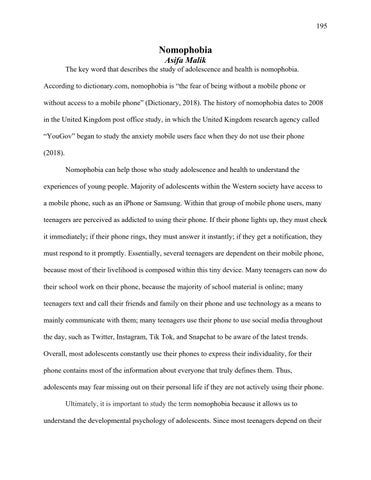195
Nomophobia Asifa Malik The key word that describes the study of adolescence and health is nomophobia. According to dictionary.com, nomophobia is “the fear of being without a mobile phone or without access to a mobile phone” (Dictionary, 2018). The history of nomophobia dates to 2008 in the United Kingdom post office study, in which the United Kingdom research agency called “YouGov” began to study the anxiety mobile users face when they do not use their phone (2018). Nomophobia can help those who study adolescence and health to understand the experiences of young people. Majority of adolescents within the Western society have access to a mobile phone, such as an iPhone or Samsung. Within that group of mobile phone users, many teenagers are perceived as addicted to using their phone. If their phone lights up, they must check it immediately; if their phone rings, they must answer it instantly; if they get a notification, they must respond to it promptly. Essentially, several teenagers are dependent on their mobile phone, because most of their livelihood is composed within this tiny device. Many teenagers can now do their school work on their phone, because the majority of school material is online; many teenagers text and call their friends and family on their phone and use technology as a means to mainly communicate with them; many teenagers use their phone to use social media throughout the day, such as Twitter, Instagram, Tik Tok, and Snapchat to be aware of the latest trends. Overall, most adolescents constantly use their phones to express their individuality, for their phone contains most of the information about everyone that truly defines them. Thus, adolescents may fear missing out on their personal life if they are not actively using their phone. Ultimately, it is important to study the term nomophobia because it allows us to understand the developmental psychology of adolescents. Since most teenagers depend on their




































